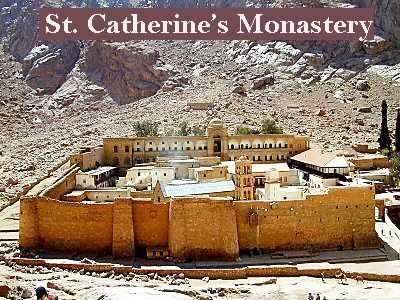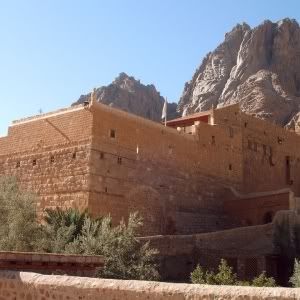- "The Promise of Prophet Muhammad (pbh) to St. Catherine"
- " The Letter from Prophet Muhammad (pbh) to the Assyrian Christians"
By
Dr. Muqtedar Khan
( Dr. Muqtedar Khan is Director of Islamic Studies at the University of Delaware and a fellow of the Institute for Social Policy and Understanding.)
In this article I propose to remind both Muslims and Christians about a promise that Prophet Muhammed (pbuh) made to Christians.
The knowledge of this promise can have enormous impact on Muslim conduct TOWARDS Christians.
Muslims generally respect the precedent of their Prophet and try to practice it in their lives.
Muslims and Christians together constitute over fifty percent of the world and if they lived in peace, we will be half way to world peace.
One small step that we can take towards fostering Muslim-Christian harmony is to tell and retell positive stories and abstain from mutual demonization.
In 628 AD, a delegation from St. Catherine’s Monastery came to Prophet Muhammed and requested his protection.
The Prophet responded by granting them a charter of rights, which I reproduce below in its entirety.


The Monastery of St. Catherine
St. Catherine’s Monastery has survived 1,400 years largely undisturbed by winning protection from the leaders of the day.
Recognizing the site’s significance to monotheism, the Prophet Mohammed (PBUH) issued a written promise granting protected status to the monks under Muslim rule, as did the Crusaders, several Ottoman emperors, and, more recently, Napoleon Bonaparte.
The Prophet Muhammad's Promise to St. Catherine:"This is a message from Muhammad ibn Abdullah, as a covenant to those who adopt Christianity, near and far, we are with them.
Verily I, the servants, the helpers, and my followers defend them, because Christians are my citizens; and by God! I hold out against anything that displeases them.
No compulsion is to be on them. Neither are their judges to be removed from their jobs nor their monks from their monasteries.
No one is to destroy a house of their religion, to damage it, or to carry anything from it to the Muslims' houses.
Should anyone take any of these, he would spoil God's covenant and disobey His Prophet. Verily, they are my allies and have my secure charter against all that they hate.
No one is to force them to travel or to oblige them to fight. The Muslims are to fight for them.
If a female Christian is married to a Muslim, it is not to take place without her approval. She is not to be prevented from visiting her church to pray.
Their churches are to be respected. They are neither to be prevented from repairing them nor the sacredness of their covenants.
No one of the nation (Muslims) is to disobey the covenant till the Last Day (end of the world)."
The first and the final sentence of the charter are critical.
They make the promise eternal and universal.
Muhammed asserts that Muslims are with Christians near and far straight away rejecting any future attempts to limit the promise to St. Catherine alone.
By ordering Muslims to obey it until the Day of Judgment the charter again undermines any future attempts to revoke the privileges.
These rights are inalienable.
Muhammed declared Christians, all of them, as his allies and he equated ill treatment of Christians with violating God’s covenant.
A remarkable aspect of the charter is that it imposes no conditions on Christians for enjoying its privileges. It is enough that they are Christians. They are not required to alter their beliefs, they do not have to make any payments and they do not have any obligations.
This is a charter of rights without any duties!
The document is not a modern human rights treaty but even thought it was penned in 628 A.D. it clearly protects the right to property, freedom of religion, freedom of work, and security of the person.
I know most readers, must be thinking so what? Well the answer is simple.
Those who seek to foster discord among Muslims and Christians focus on issues that divide and emphasize areas of conflict.
But when resources such as Muhammad’s promise to Christians are invoked and highlighted it builds bridges. It inspires Muslims to rise above communal intolerance and engenders good will in Christians who might be nursing fear of Islam or Muslims.
When I look at Islamic sources, I find in them unprecedented examples of religious tolerance and inclusiveness.
They make me want to become a better person.
I think the capacity to seek good and do good inheres in all of us. When we subdue this predisposition towards the good, we deny our fundamental humanity.
In this holiday season, I hope all of us can find time to look for something positive and worthy of appreciation in the values, cultures and histories of other peoples.
(B) A Letter from the Prophet Muhammad To The Assyrian Christians
Read here for more
A Letter from the Prophet Muhammad
To the Assyrian Christians"God has told me in a vision what to do, and I confirm His command by giving my solemn promise to keep this agreement.The peace of God be over them all!
To the followers of the Islam I say:
Carry out my command, protect and help the Nazarene nation in this country of ours in their own land.
Leave their places of worship in peace; help and assist their chief and their priests when in need of help, be it in the mountains, in the desert, on the sea, or at home.
Leave all their possessions alone, be it houses or other property, do not destroy anything of their belongings, the followers of Islam shall not harm or molest any of this nation, because the Nazarenes are my subjects, pay tribute to me and will help the Muslims.
No tribute, but what is agreed upon, shall be collected from them, their church buildings shall be left as they are, they shall not be altered, their priests shall be permitted to teach and worship in their own way-the Nazarenes have full liberty of worship in their churches and homes.
None of their churches shall be torn down, or altered into a mosque, except by the consent and free will of the Nazarenes.
If any one disobeys this command, the anger of God and His Prophet shall be upon him.
The tribute paid the Nazarenes shall be used to promote the teachings of Islam and shall be deposited at the treasury of Beth Almal.
A common man shall pay one denar (piece of money), but the merchants and people who own mines of gold and silver and are rich shall pay twelve denars. Strangers and people who have no houses or other settled property shall not have taxes levied upon them.
If a man inherits property he shall pay a settled sum to the Baitulmal treasury.
The Christians are not obliged to make war on the enemies of Islam, but if an enemy attacks the Christians, the Muslims shall not deny their help, but give them horses and weapons, if they need them, and protect them from evils from outside and keep the peace with them.
The Christians are not obliged to turn Muslims, until God's will makes them believers.
The Muslims shall not force Christian women to accept Islam, but if they themselves wish to embrace it, the Muslims shall be kind to them.
If a Christian woman is married to a Muslim and does not want to embrace Islam, she has liberty to worship at her own church according to her own religious belief, and her husband must not treat her unkindly on account of her religion.
If any one disobeys this command, he disobeys God and his prophet and will be guilty of a great offense.
If the Nazarenes wish to build a church, their Muslim neighbors shall help them. This shall be done, because the Christians have obeyed us and have come to us and pleaded for peace and mercy.
If there be among the Christians a great and learned man the Muslims shall honor him and not be envious of his greatness.
If any one is unjust and unkind to the Christians he will be guilty of disobeying the Prophet of God.
The Christians should not shelter an enemy of Islam or give him horse, weapon or any other help.
If a Muslim is in need the Christian shall for three days and nights be his host and shelter him from his enemies.
The Christians shall, furthermore, protect the Mohammedan women and children and not deliver them up to the enemy or expose them to view.
If the Nazarenes fail to fulfil these conditions, they have forfeited their right to protection, and the agreement is null and void.
This document shall be entrusted to the Christian chief and head of their church for safe keeping."
This agreement is written by Moavijah Ben Sofian, according to the dictates of Muhammad, the Messenger of God, in the 4th year of the Hegira in the city of Medina.
COMMENTARY
From Marina Mahathir
Read here for more
- A confident Muslim is unfazed by the issue of God's name. God speaks to all of humankind in the Quran and never said that only Muslims could call him by the name Allah.
- A confident Muslim has 99 names to choose from to describe that One God. My favourites are Ar-Rahman (The All-Compassionate) and Ar-Rahim (The All-Merciful).
- A confident Muslim never gets confused over which is his/her religion and which is other people's. For instance, a confident Muslim knows exactly what the first chapter of the Quran is. And it's not the Lord's Prayer.
- A confident Muslim will not walk into a church, hear a liturgy in Malay or Arabic where they use the word 'Allah' and then think that he or she is in a mosque. A confident Muslim knows the difference.
- A confident Muslim is generous, inclusive and doesn't think that his or her brethren is made exclusive through the use of a single language. The confident Muslim is well aware that in the Middle East, all services of ANY religion are in Arabic because that's what they all speak.
- A confident Muslim knows the basis of his/her faith are the five pillars of Islam and will not be shaken just because other people call God by the same name.
- A Muslim believes in only One God. Therefore it makes sense that other people should call God by the same name because there is no other God.
ART THOU NOT aware that it is God whose limitless glory all [creatures] that are in the heavens and on earth extol, even the birds as they spread out their wings? Each [of them] knows indeed how to pray unto Him and to glorify Him; and God has full knowledge of all that they do:(Surah Nour, Verse 41) (Asad)
In 2007, the Majlis Agama Negeri Perlis, which is a large majlis filled with people very learned in Islamic religious knowledge, discussed the question of the use of 'Allah' by non-Muslims.
Their unanimous decision?
They issued a fatwa to say that there is absolutely nothing wrong with non-Muslims using the word at all.(This was told to me by Dr. Asri but I cannot find the fatwa anywhere online because all the religious departments' websites are so useless.)
No comments:
Post a Comment